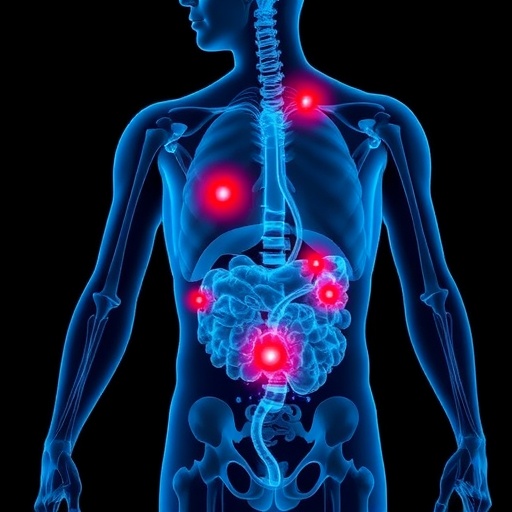McGill University researchers, alongside collaborators from Israel and Ireland, have made groundbreaking strides in the application of artificial intelligence to healthcare, particularly in the diagnosis of complex regional pain syndrome (CRPS). Their pioneering AI technology offers the capability to analyze the gut microbiome, revealing a distinctive pattern that could significantly enhance the accuracy of CRPS identification. This advancement potentially marks a turning point in the way CRPS is both diagnosed and treated, promising hope to those affected by this debilitating condition.
CRPS is a perplexing and chronic pain disorder that impacts an estimated 400,000 to 2.1 million individuals globally. Characterized by severe, persistent pain—often exceeding the discomfort of the initial injury—CRPS commonly arises in a limb post-injury or surgery. The alarming symptoms entail changes in skin color and temperature, swelling, and, notably, an intensity of pain that can severely impact a person’s quality of life and lead to long-term disabilities.
Despite numerous treatment options available, CRPS remains notoriously difficult to manage effectively. Patients frequently endure prolonged periods of suffering, often waiting an excessive amount of time before receiving appropriate medical attention. Dr. Amir Minerbi, the senior author and Director of the Institute for Pain Medicine at Rambam Health Campus, emphasizes the urgency for innovations in the diagnosis and treatment of CRPS. The hope is that this new approach using AI to analyze gut microbiome samples can provide quicker and more reliable identification of the syndrome, thus allowing for timely and effective intervention.
The research findings, published in the esteemed journal Anesthesiology, utilized sophisticated machine learning techniques to examine microbiome samples sourced from two distinct patient cohorts—one in Israel and another in Canada. This cross-border study serves as a powerful testament to the potential of AI in global health diagnostics, demonstrating the study’s versatility and applicability across various populations despite geographic and lifestyle differences.
Emmanuel Gonzalez, the lead author of the study and a key member of the McGill Centre for Microbiome Research, expressed the significance of their findings. By training their machine learning models on high-quality microbiome data from Israeli patients, the researchers succeeded in accurately predicting CRPS in Canadian patients with a striking over 90% accuracy rate. The ability of their AI system to maintain such high levels of accuracy across varying demographics is extraordinary, and the researchers believe they have identified a universal ‘microbiome signature’ linked to CRPS.
In a surprising twist, the study revealed that even among patients whose symptoms had dissipated after an amputation of the affected limb, the gut microbiome signature associated with CRPS remained evident. This finding suggests that the gut microbiome may play a critical role in predisposing certain individuals to develop CRPS in response to injury or other triggering events. Such insights could revolutionize our understanding of CRPS and pave the way for novel preventive and therapeutic strategies tailored to an individual’s unique microbiome profile.
The comprehensive nature of this research stems from the analysis of 120 microbiome samples as well as over 100 plasma samples, marking it as one of the most extensive studies exploring the relationship between gut microbiota and chronic pain conditions to date. The implications of these findings extend well beyond CRPS, opening new avenues for research into the gut-brain axis and its implications for various pain disorders.
As the medical community grapples with the complexities of chronic pain management, embracing the emerging field of microbiome research could unearth groundbreaking insights into the underlying mechanisms that govern pain and inflammation. The potential for a microbiome-based diagnostic tool could indeed reshape clinical practices, offering a new lens through which to view chronic pain syndromes and ultimately leading to improved patient outcomes.
In essence, the collaborative efforts between McGill University and their international partners highlight the powerful intersection of artificial intelligence and microbiome research in the fight against chronic pain. As this research continues to evolve, the broader healthcare landscape may witness a recalibration in how we approach diagnosis and management of conditions traditionally seen as elusive and challenging.
The study, entitled “Altered Gut Microbiome Composition and Function in Individuals with Complex Regional Pain Syndrome,” reflects an important leap forward in the understanding of CRPS, driven by a multidisciplinary team of researchers committed to advancing pain medicine. With the support of funding from a variety of esteemed institutions, including the Rambam Health Care Campus and the Weston Family Foundation, the researchers are poised to continue their innovative work in this critical field.
This emerging line of inquiry is not merely academic; it carries profound implications for the millions of individuals grappling with chronic pain. The identification of a microbiome signature specific to CRPS could pave the way for not only better diagnostic methodologies but also targeted therapeutic interventions tailored to the specific microbiological contexts of individual patients.
As the research community eagerly anticipates further developments in this area, the integration of AI and microbiome analysis stands as a promising frontier in combating one of healthcare’s most persistent challenges: chronic pain syndromes such as CRPS.
Subject of Research: Gut microbiome analysis relating to complex regional pain syndrome.
Article Title: Altered Gut Microbiome Composition and Function in Individuals with Complex Regional Pain Syndrome.
News Publication Date: 3-May-2025.
Web References: Link to the study
References: Available in the published study.
Image Credits: Not specified.
Keywords
Tags: AI technology in diagnosticsartificial intelligence in healthcarechronic pain syndrome diagnosiscomplex regional pain syndrome researchCRPS treatment advancementsGut microbiome analysisimproving CRPS patient outcomesinterdisciplinary healthcare collaborationMcGill University medical researchpain management innovationsrevolutionizing pain medicineunderstanding chronic pain disorders





